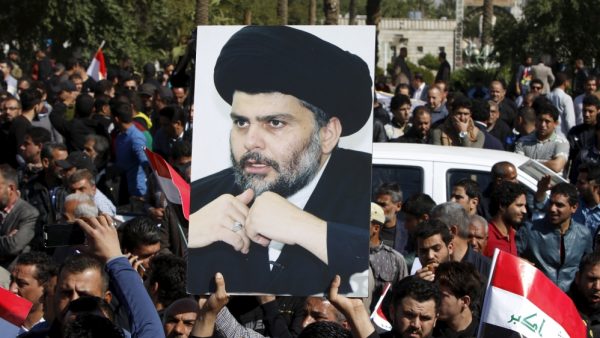
Hundreds of followers of the Iraqi Shia leader, Muqtada al-Sadr, stormed into the Iraqi parliament building, demanding its speaker to halt the session. On the other hand, the country’s Prime Minister Haider al-Abadi warned that these protests can lead to the failure of the state. After the protests, Moqtada al-Sadr – who spent several years studying in the city of Qom – reportedly travelled to Iran.
Although the protesters retreated, the underlying challenge to Iraq’s leadership and stability isn’t over yet. In addition, these protests highlight several messages that Iran is attempting to send. After Iran’s preferred candidate for Prime Minister, Nuri al-Maliki, was replaced by Haidar al-Abadi, Tehran managed to increase and retain its influence in Iraq through Shiite militias, through the Iraqi government, and other means.
Nevertheless, Iran’s concerns have been raised recently as a result of the United States’ increasing role in Iraq and its improving ties with the al-Abadi government. It is less likely that Sadr has invoked such a demonstrations without enjoying the blessing of Iran’s Supreme Leader, Ali Khamanei, and Qasem Soleimani, commander of Quds Force.
Through its leverage, Tehran could easily use its militia proxies to send a strong message to the Iraqi government that Tehran is not happy with the government’s relationship with the US. In addition, through these protests, Tehran can project the significant influence that it wields in Iraq, to the US and other governments in the region.
Iran’s narrative: Savior of Iraq
Currently, some of the powerful Iraqi Shiite groups that Iran has close connections with, and is investing its resources in, are Sadr’s Promised Day Brigade – the successor to the Mahdi Army – Badr Organization, Asa’ib Ahl al Haqq (League of the Righteous) and Kata’ib Hezbollah (Battalions of Hezbollah).
Iranian leaders have spread the narratives, throughout their media and diplomatic means, that Iran is savior of Iraq, that Iraq is following in the footsteps of the Islamic Republic’s revolution and that Iran has the obligation to support the Iraqi people for humanitarian reasons.
When it comes to Iran’s role in Iraq, Iranian leaders – across the political spectrum including reformists, moderates, hardliners and “principalists” – follow the directions of the key decision makers: the Supreme Leader, Ayatollah Ali Khamenei and the Revolutionary Guard Corps (IRGC).
For example, even the pragmatist Ayatollah Akbar Hashemi Rafsanjani, the chairman of the Expediency Council and supporter of President Rowhani, pointed out this week that the Islamic Republic of Iran’s support of the Iraqi government and Iraqi people is anchored in humanitarian and Islamic principles. He statedduring a meeting with Jan Kubis, the UN special envoy for Iraq, that “Iran is ready to cooperate in various areas if the international community and the UN are honest and determined to solve Iraq’s problem.”
Any opposition from Iran’s political figures towards Iran’s current role in Iraq, would mean opposition to Mr. Khamenei and the IRGC. Their opposition will most likely lead to the death of their political career and being approved by the Guardian Council to run again for government positions.
Propaganda and sectarian agenda
Iran’s propaganda regarding Iraq contradicts the reality. Iran has utilized its soft and hard power skillfully to exert influence in Iraq. On the one hand, Iran’s social, religious and cultural affinities with the Shiite population in Iraq have provided the Islamic Republic with a powerful platform to exert influence in Iraq. In addition, economically speaking, Tehran has used trade to ratchet up it leverage in Baghdad.
The ISIS has also provided Iranian leaders with the venues not only to project Iran as a defender of the Iraqi people but also as a robust excuse to increase Tehran’s military presence in Iraq and further dominate Iraqi’s security, intelligence and political establishments.
On the other hand, by establishing ties, training, financing, by unifying and arming Iraqi Shiite militias, Iran seeks to accomplish several objectives- assisting the Shiite militias to achieve political successes in Iraq, and to enter the parliament and have a say in the internal affairs of Baghdad, which are in alignment with Iran’s interests. This can ensure Iran’s influence in Iraq for the long-term.
Reportedly, Iran has repeatedly attempted to encourage the followers of Dawa and Sadr to unite in order to win more seats in the elections, and Tehran funded its preferred candidates in the parliamentary elections.
If the Iraqi government becomes reluctant in preserving Tehran’s political and economic interests in Baghdad, IRGC leaders can threaten the government by showing their influence through invoking the Shiite Iraqi leaders to protest against the government and threaten their hold on power. In addition, for Iran, the Iraqi Shiite militias allow Iran to exert more influence in Iraq, thus tipping the regional balance of power in favor of Iran vis-à-vis other Sunni countries and the United States.
The political instability will continue to persist in Iraq, mainly due to Iran’s sectarian agenda, IRGC support for Shiite militias, and Iran’s policy of divide and rule.
Dr. Majid Rafizadeh, an Iranian-American political scientist and Harvard University scholar,
Al Arabiya

Leave a Reply
You must be logged in to post a comment.